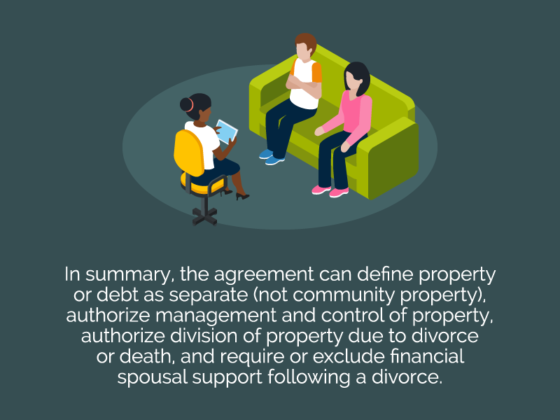Texas Premarital Agreement: The Good, The Bad, and The Realistic

This page is intended to shed light on what a Texas premarital agreement can protect, what it cannot protect, and why it is nearly bulletproof.
What Can a Prenup Do?
The Texas Family Code determines what can be included and what cannot be included in a premarital agreement. The parties to a premarital agreement may contract with respect to eight areas:
- the rights and obligations of each of the parties in any of the property of either or both of them whenever and wherever acquired or located;
- the right to buy, sell, use, transfer, exchange, abandon, lease, consume, expend, assign, create a security interest in, mortgage, encumber, dispose of, or otherwise manage and control property;
- the disposition of property on separation, marital dissolution, death, or the occurrence or nonoccurrence of any other event;
- the modification or elimination of spousal support;
- the making of a will, trust, or another arrangement to carry out the provisions of the agreement;
- the ownership rights in and disposition of the death benefit from a life insurance policy;
- the choice of law governing the construction of the agreement; and
- any other matter, including their personal rights and obligations, not in violation of public policy or a statute imposing a criminal penalty.
In summary, the agreement can define property or debt as separate (not community property), authorize management and control of the property, authorize the division of property due to divorce or death, and require or exclude financial spousal support following a divorce.
The agreement also allows you to decide which State will oversee your contract, no matter where you live if or when the contract is enacted. Additionally, you can write anything into the contract that is important to you, so long as it does not violate public policy and is not illegal.
What Can’t a Premarital Agreement Do?
The only area that a Texas premarital agreement cannot enforce, besides violations of public policies and criminal laws, is in regards to child support. The State of Texas believes it is too important for parents to be financially responsible to their children to allow anyone to contract out of that responsibility.
How Can I Get Out of a Premarital Agreement?
Simply put, there are two ways ‘out’ of a premarital agreement, however, they are difficult to achieve.
- The first is to prove that the agreement was not signed voluntarily. Texas courts generally perceive adults as capable of making their own decisions and therefore should be held accountable to them.
- Second is to prove the agreement was ‘unconscionable’, meaning that the agreement was significantly unfair and misleading to the other party. Proving the agreement was unconscionable is incredibly complicated in Texas courts. Just because one party got a ‘bad deal’ or the ‘short end of the stick’ doesn’t prove that the agreement was unconscionable. If the judge, in the unlikely event, does see the agreement as unconscionable, then there must also be evidence that debts, assets, or other terms essential to the agreement were not completely or honestly disclosed.
About The Wright Firm LLP
The Wright Firm, L.L.P., serves clients in Dallas County, Collin County, Denton County, Tarrant County, and surrounding areas. The firm specializes in Divorce, Family Law, Estate Planning, Probate, Business, and Criminal defense. The Wright Firm, L.L.P., is positioned to provide a personalized, local, and experienced approach to each client’s needs. Contact us today.



Leave a Reply
Want to join the discussion?Feel free to contribute!